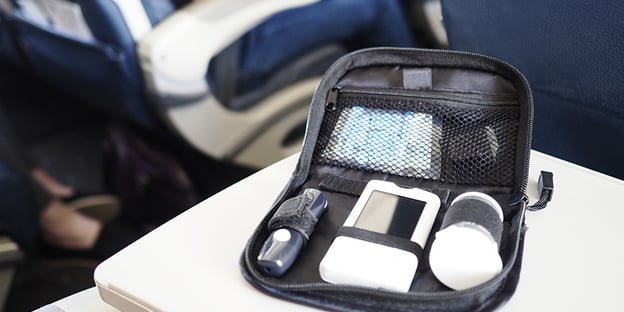Ice cream. Cookies. Gummy candies. Pregnancy can bring with it a major craving for sweet stuff. But pregnancy can also bring along some major changes in how your body processes the foods you might be craving most.
Gestational diabetes is common in pregnancy, but it’s not the same for everybody. Managing gestational diabetes means mapping your own journey and figuring out — with the help of your care team — what measures will help you control your glucose levels most effectively.
What is gestational diabetes? What are the risks? And what are some smart strategies to manage it for a healthier and happier pregnancy?
What Is Gestational Diabetes?
 Gestational diabetes is a type of diabetes where pregnancy hormones prevent the body from using insulin effectively — occurring in patients who did not have diabetes prior to pregnancy.
Gestational diabetes is a type of diabetes where pregnancy hormones prevent the body from using insulin effectively — occurring in patients who did not have diabetes prior to pregnancy.
Diabetes is generally thought of as a long-term disease. If you have it, you usually have it for the rest of your life.
Gestational diabetes, on the other hand, occurs only in pregnant women. And though it can have long-term effects, it lasts only as long as the pregnancy. Once a baby is born, both pregnancy and diabetes end simultaneously (a great time for a new mom to celebrate with a piece of cake!).
But even though gestational diabetes ends as soon as you give birth, the risks linger. Having gestational diabetes significantly increases your risk of developing Type 2 diabetes later in life. In fact, after diabetes in pregnancy, you have a one in two chance of developing Type 2 diabetes.
Risk Factors for Gestational Diabetes
According to the Mayo Clinic, about 2% to 10% of U.S. pregnant women develop the disease every year. Risk factors include:
- Being overweight or obese
- Being sedentary
- Having a family history of diabetes
- Having prediabetes
- Developing gestational diabetes during a previous pregnancy
- Having polycystic ovary syndrome (PCOS)
- Having previously delivered a baby weighing more than 9 pounds
- Being of a certain race or ethnicity, such as Black, Hispanic, American Indian, and Asian American
If you get a diagnosis, don’t be hard on yourself. Some risk factors, like your family history and having PCOS, are completely out of your hands. And while you can mitigate your risk for the disease by maintaining a healthy weight and being active, there’s no magic wand you can wave to ensure you don’t get gestational diabetes.
Diagnosis and Screening
The screening for gestational diabetes is typically done between 24 to 28 weeks of pregnancy, using an oral glucose tolerance test. Essentially, the patient is asked to drink a highly sweetened liquid, and then glucose readings are done at various intervals to test how effectively they’re able to process all that sugar.
This standard screening is crucial for early detection and management, regardless of your prior risk factors.
The Impact of Gestational Diabetes on Pregnancy and the Fetus
 Post-partum, anybody who has had gestational diabetes is at an increased risk for Type 2 diabetes later in life. During pregnancy, however, gestational diabetes doesn’t typically have many symptoms for the mother. Some women experience frequent urination or increased thirst. And just like with other types of diabetes, patients with gestational diabetes need to carefully monitor and manage their glucose levels.
Post-partum, anybody who has had gestational diabetes is at an increased risk for Type 2 diabetes later in life. During pregnancy, however, gestational diabetes doesn’t typically have many symptoms for the mother. Some women experience frequent urination or increased thirst. And just like with other types of diabetes, patients with gestational diabetes need to carefully monitor and manage their glucose levels.
The most severe effects of gestational diabetes are on the resulting baby. Complications can include:
- Excessive birth weight
- Early birth
- Breathing problems
- Increased risk of obesity
- Risk of stillbirth
Babies born after their mother has gestational diabetes may also develop hypoglycemia: During gestation, their bodies increase insulin production in response to the mother’s high blood sugar levels.
Managing Gestational Diabetes
Managing gestational diabetes is a lot like managing Type 1 or Type 2 diabetes. Some patients are able to avoid taking insulin for gestational diabetes, and they can control their blood sugar levels through diet and exercise alone, with close monitoring by their healthcare team and a dietician.
Other times, diet and exercise simply aren’t enough to keep glucose levels in the right range, and insulin is needed. If your doctor prescribes insulin during your pregnancy, don’t worry. It doesn’t cross the placenta, so it can’t be ingested by the developing fetus. Most patients take Humulin N, an intermediate-acting insulin that is slower to act and lasts longer than other types of insulin.
How Much Should I Exercise if I Have Gestational Diabetes?
Exercise should be moderate, and doctors usually advise pregnant women to maintain the same kinds of physical activity they did before pregnancy. This isn’t the time to begin a new long-distance running hobby, for example. Talk to your doctor about which exercises are appropriate for you during pregnancy. And, as with all types of diabetes, getting enough sleep and managing your stress can also help you keep your blood sugar levels under control.
The Role of Continuous Glucose Monitors (CGMs)
 Because so many women control their gestational diabetes with diet and exercise, CGMs have become a valuable tool for gestational diabetes patients. They allow for detailed blood sugar monitoring without frequent office visits, so patients can adjust their diet and exercise accordingly to reach their target blood sugar levels.
Because so many women control their gestational diabetes with diet and exercise, CGMs have become a valuable tool for gestational diabetes patients. They allow for detailed blood sugar monitoring without frequent office visits, so patients can adjust their diet and exercise accordingly to reach their target blood sugar levels.
And because CGMs are worn on the body, this information is gathered automatically, so it’s one less thing to have to think about. And gestational diabetes is managed with the same CGMs that Type 1 and Type 2 patients wear — no special equipment is required.
We’ll Rush Your CGM!
Getting a CGM for your gestational diabetes? Let us know! We’ll do everything we can to prioritize your case, so you get your CGM early enough to help you manage your blood glucose levels throughout your pregnancy.
Give us a call and tell us you have gestational diabetes, or include it in the “message” field in the contact form.

After delivery, you still may need to closely monitor your blood sugar levels for about six to eight weeks, unless directed otherwise by your doctor. And because of that increased risk of Type 2 diabetes, it’s a good idea to ask your doctor for regular screenings.
Coping With Gestational Diabetes
A diagnosis of gestational diabetes can be a hard thing to deal with. It's completely natural to feel stressed or worried about your baby's health. And it’s also completely natural to feel frustrated and resentful about the extra work involved in managing gestational diabetes, while missing the treats you might be craving.
But remember, you're not alone. Gestational diabetes is very common, and support is out there. Healthcare providers are there to help you every step of the way, ensuring you and your baby remain healthy. If you’re struggling with your mental health after giving birth, talk to your doctor. They can direct you to support groups, therapists, and other resources to help.
Early detection and proper management of gestational diabetes are vital for the health of both you and your baby. Expecting mothers should be proactive in seeking education and support from healthcare professionals to ensure a healthy pregnancy and reduce the risk of complications associated with gestational diabetes.
Ready for a CGM to help manage your gestational diabetes? The good news is there are plenty of options for your unique needs. Our CGM guide walks you through the options so you can choose one that works for you.

Ready to get your CGM? We can help!



 Gestational diabetes is a type of diabetes where pregnancy hormones prevent the body from using insulin effectively — occurring in patients who did not have diabetes prior to pregnancy.
Gestational diabetes is a type of diabetes where pregnancy hormones prevent the body from using insulin effectively — occurring in patients who did not have diabetes prior to pregnancy. Post-partum, anybody who has had gestational diabetes is at an increased risk for Type 2 diabetes later in life. During pregnancy, however, gestational diabetes doesn’t typically have many symptoms for the mother. Some women experience frequent urination or increased thirst. And just like with other types of diabetes, patients with gestational diabetes need to carefully monitor and manage their glucose levels.
Post-partum, anybody who has had gestational diabetes is at an increased risk for Type 2 diabetes later in life. During pregnancy, however, gestational diabetes doesn’t typically have many symptoms for the mother. Some women experience frequent urination or increased thirst. And just like with other types of diabetes, patients with gestational diabetes need to carefully monitor and manage their glucose levels. Because so many women control their gestational diabetes with diet and exercise, CGMs have become a valuable tool for gestational diabetes patients. They allow for detailed blood sugar monitoring without frequent office visits, so patients can adjust their diet and exercise accordingly to reach their target blood sugar levels.
Because so many women control their gestational diabetes with diet and exercise, CGMs have become a valuable tool for gestational diabetes patients. They allow for detailed blood sugar monitoring without frequent office visits, so patients can adjust their diet and exercise accordingly to reach their target blood sugar levels.





